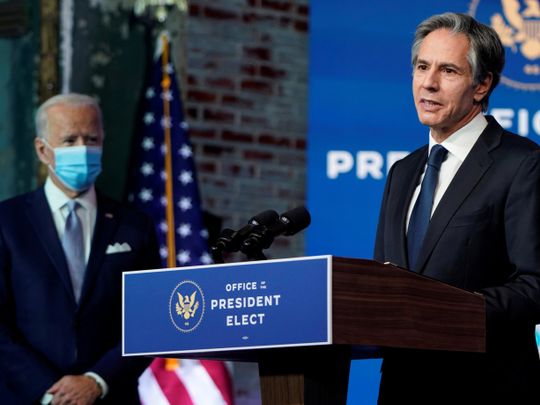
Washington: President-elect Joe Biden’s pick to lead the State Department said the US is still a “long way” from being able to secure a longer-term agreement with Tehran that improves and strengthens the original Iran nuclear agreement.
Antony Blinken, Biden’s choice for secretary of state, reiterated the incoming administration’s desire to re-enter the 2015 accord that President Donald Trump withdrew from three years ago. But Blinken - who said the accord helped restrain Iran’s nuclear programme - said Tehran needs to return to compliance with the terms of the deal first and he vowed to work closely with Congress as potential talks progress.
“If Iran comes back into compliance we would, too, but we would use that as a platform with our allies and partners who would once again be on the same side with us, to seek a longer and stronger agreement,” Blinken said in testimony Tuesday to the Senate Foreign Relations Committee. “Having said that, I think we’re a long way from there. We would have to see once the president elect is in office what steps Iran actually takes and is prepared to take.”
Blinken, who served as deputy secretary of state in the Obama administration and was a top aide to Biden when he was a senator, was asked to defend Obama-era foreign policy decisions in places such as Libya. That country fell into chaos and portions of it were under control of Daesh militants after Muammar Gaddafi was killed.
“We didn’t fully appreciate the fact” that Gaddafi “made sure there was no rival to his power,” Blinken said. “There was a plan that ran into some reality.”
The hearing was marked by tension between Blinken’s clear intention to undo many of Trump’s signature foreign-policy initiatives, such as quitting the Iran nuclear deal, while also acknowledging the world has changed so much in the last four years that reverting to the old approach isn’t possible.
Tougher approach
Under questioning from Republican senators, Blinken acknowledged that Trump’s foreign policy has in some occasions led to favourable outcomes. He noted a tougher approach to China, diplomatic deals with Israel and higher defence spending from Nato partners as some examples.
More broadly, Blinken promised to revitalise alliances and approach the world with humility, offering a contrast with outgoing Secretary of State Michael Pompeo’s embrace of “swagger” and his take-it-or-leave-it diplomatic approach.
“Humility and confidence should be the flip sides of America’s leadership coin,” Blinken said in his prepared remarks. “Humility because we have a great deal of work to do at home to enhance our standing abroad.”
The statements signal that Blinken intends to draw the curtain on four years of “America First,” in which Trump browbeat the Nato alliance, slammed staunch allies such as Germany and France and demanded that nations like South Korea and Japan pay more for the privilege of hosting US troops.
Public scepticism
Gone was any hint of Pompeo’s favourite term that was frequently derided by career diplomats - or the departing administration’s public scepticism of multilateral institutions. Already the Biden team has signalled it will quickly rejoin the Paris Climate accord and reverse Trump’s plan to leave the World Health Organisation.
At the same time, Blinken, 58, acknowledged the threats posed by China, Russia and North Korea, saying the Biden administration will “engage the world not as it was, but as it is.”
The incoming administration will face some major foreign-policy decisions immediately after taking office, while managing the COVID-19 pandemic that has killed 400,000 Americans, according to Johns Hopkins University data, and left the US economy reeling.
There were elements in Blinken’s remarks that went unspoken for the last four years and will please progressives, including a promise to tackle climate change, which he called an “existential threat” and Trump once referred to as a “hoax.”
And he acknowledged the polarisation in the US and the recent rioting at the US Capitol, which Republicans are increasingly blaming on rhetoric fuelled by Trump.
“Our ability to be a strong leader for and defender of democracy and human rights also depends to a large extent on the strength of our own democracy here at home and as we’ve discussed we have some work to do,” Blinken said.








